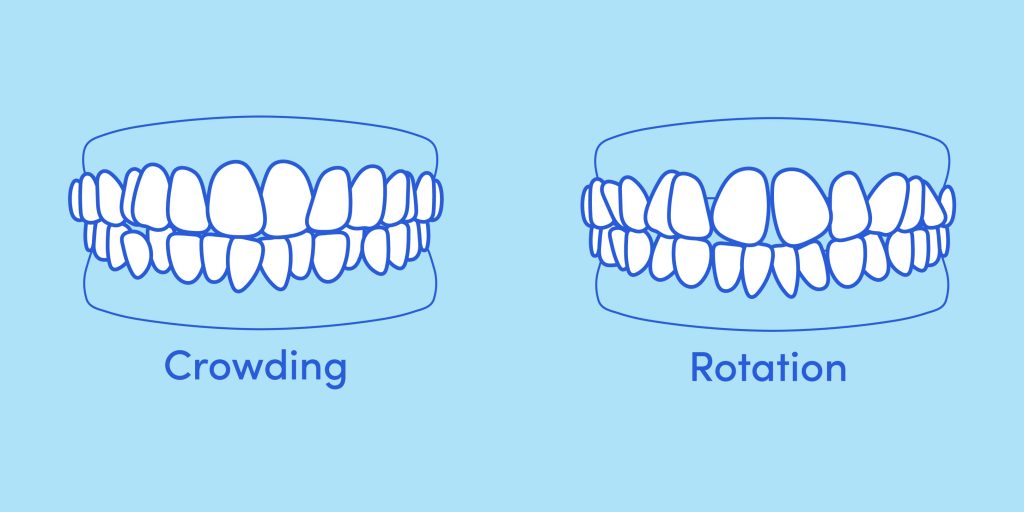Navigating the sensitivity of misaligned teeth can be challenging, especially when addressing someone’s crooked teeth, which might come across as critical rather than helpful. Misaligned or crooked teeth often signal malocclusion, a condition where teeth and jaws fail to align properly.
Having explored the signs that may indicate a need for braces, it’s now crucial to understand how malocclusion impacts your smile. This includes delving into the various types of malocclusions, exploring their causes, symptoms, and available treatment options. Read further to also know how modern dental solutions like Zenyum invisible braces can be used for correcting malocclusion.
This article is for informational purposes only and is not intended to be taken as medical advice. Please consult with your treating dentist for medical advice specific to your condition. Zenyum does not provide medical advice and our systems are doctor-directed treatments.
What is malocclusion?
Malocclusion refers to conditions where teeth and jaws don’t quite line up as they should, which can affect how your mouth moves and functions naturally. This includes things like crooked teeth or a bite that doesn’t fit together properly, impacting both how your smile looks and your overall oral health.
What causes malocclusion of teeth?
Several factors can contribute to malocclusion, including, but not limited to:
- Genetics: Inherited traits such as jaw size and shape significantly influence teeth alignment.
- Thumb sucking or pacifier use: These habits can hinder teeth and jaw development, particularly in children.
- Premature tooth loss: Early loss of baby teeth or improper eruption of adult teeth can disrupt proper alignment.
- Injuries or trauma: Accidents affecting the jaw or teeth may lead to misalignment.
- Cleft lip and palate: Birth defects affecting the mouth’s structure can also cause malocclusion.
Understanding these causes is crucial for effectively treating and correcting this dental condition, ensuring optimal oral health and function.
Symptoms of malocclusion
Having explored some of the causes, it’s essential to recognise the signs and symptoms associated with malocclusion too.
- Crooked or crowded teeth: Teeth that are misaligned or overlap.
- Difficulty chewing or biting: Problems with biting food properly or discomfort while chewing.
- Speech difficulties: Pronunciation issues or speech impediments.
- Jaw pain or discomfort: Pain in the jaw joint (TMJ) or facial muscles.
- Mouth breathing: Habitual breathing through the mouth instead of the nose.
- Excessive wear of tooth enamel: Uneven wear patterns on teeth.
- Facial asymmetry: Misalignment affecting the appearance of the face.
Classifications of malocclusion
Gaining insight into the different classifications of malocclusion is crucial for identifying how teeth and jaws may be misaligned. This knowledge not only aids in pinpointing potential issues but also facilitates informed discussions with your dentist or orthodontist to explore tailored treatment options suited to your dental needs.
Class 1 malocclusion
Class 1 malocclusion is the most common form, characterised by generally good teeth alignment but with the upper teeth slightly overlapping the lower ones.
It usually does not cause significant functional problems but may impact the smile’s appearance. The bite is typically normal, where the molars fit together correctly, but there may be minor crowding or spacing issues among the teeth.
Class 2 malocclusion
Class 2 malocclusion is characterised by an overbite, where the upper teeth noticeably overlap the lower teeth. This malocclusion is commonly associated with a protruding upper jaw or a recessed lower jaw, affecting facial harmony.
It may cause challenges in chewing and speaking, along with aesthetic concerns. Orthodontic treatment is often necessary to realign the teeth and jaws.
Class 3 malocclusion
Class 3 malocclusion, known as an underbite, occurs when the lower front teeth extend further forward than the upper front teeth. This dental misalignment is often caused by an underdeveloped upper jaw, an overdeveloped lower jaw, or a combination of both.
It often results in a noticeable lower jaw prominence and can impact both the function and appearance of the bite. Treatment options may include orthodontic appliances or, in severe cases, corrective jaw surgery to align the teeth and jaws properly.
Common types of malocclusion
Malocclusion covers a range of conditions where teeth and jaws are misaligned, affecting both dental function and appearance. Here are several common types:
Crowding and rotation

This occurs when there’s not enough space in your jaw for all your teeth to fit comfortably. As a result, some teeth may overlap or twist, creating a tangled arrangement that can cause dental discomfort.
It also makes it tricky to brush and floss properly, increasing the risk of plaque buildup and potential dental issues down the road.
Gaps

Spaces between teeth can result from different factors such as missing teeth or abnormal growth of the jawbone. This condition not only affects the appearance of your smile but also impacts dental function. It may make chewing certain foods more challenging and can lead to issues with speech clarity.
Additionally, these gaps can sometimes create areas where food particles get trapped, potentially increasing the risk of dental decay and gum problems if not properly addressed with good oral hygiene practices.
Protruding teeth

Protruding teeth, also known as buck teeth, occur when the upper front teeth extend outward, often due to differences in jaw size or habits like thumb sucking. This can affect the overall appearance of the face, creating an imbalance in facial aesthetics.
Additionally, protruding teeth are more susceptible to dental injuries such as chipping or fractures, especially during accidents or impacts. Addressing this malocclusion through orthodontic treatment can help improve both the function and appearance of the teeth and reduce the risk of dental trauma.
Underbite

Underbite occurs when the lower front teeth extend past the upper front teeth when the mouth is closed. This happens because either the lower jaw protrudes forward or the upper jaw is set back. It’s not just about how it looks—it can also make it harder to speak clearly and chew food properly.
Plus, having an underbite can affect how balanced your face looks, causing asymmetry that some people find bothersome. It is important to also note that correcting an underbite cannot be entirely fixed with braces due to underlying bone development.
Crossbite

Crossbite involves teeth that are misaligned, where some teeth point toward the cheek or tongue instead of fitting snugly against their opposing teeth. This misalignment can lead to several issues, such as uneven tooth wear, gum recession, and even changes in facial symmetry over time.
Early intervention for crossbite is vital to minimise dental risks and achieve optimal oral health and facial balance.
Beyond understanding the types of malocclusion, it’s valuable to consider how these misalignments can impact overall health. For instance, they may contribute to temporomandibular joint (TMJ) disorders or affect breathing during sleep, highlighting their broader implications beyond dental aesthetics.
How to fix malocclusion?
Fixing malocclusion involves various approaches tailored to each individual’s specific condition. Early intervention upon detection can lead to simpler treatments, potentially avoiding invasive procedures later in life.
Invisible braces

Invisible braces have emerged as a discreet and highly effective option for correcting malocclusions. They gently apply pressure to shift teeth into proper alignment over time, improving both dental aesthetics and oral health. As they are removable, they also facilitate easy cleaning, contributing to better hygiene throughout treatment.
Zenyum Invisible Braces exemplify this modern approach, offering custom-made aligners that are comfortable and barely noticeable. Designed to address a range of dental issues from minor adjustments to more complex malocclusions, Zenyum aligners are changed every few weeks to gradually align teeth. This innovative treatment allows individuals to achieve a confident smile discreetly and comfortably, offering a modern alternative to traditional metal braces.
Uncertain about your teeth alignment or its severity? Start your journey to a brighter smile by taking advantage of our free at-home Smile Assessment to find out!
Traditional braces
By utilising brackets attached to the teeth and applying gentle, controlled pressure over time, traditional braces gradually guide teeth into their optimal positions. This method helps improve dental function and enhances aesthetics while also contributing to proper jaw alignment.
This alignment can potentially minimise the occurrence of oral health problems such as tooth decay and gum disease, contributing to overall dental well-being.
What happens if dental malocclusion is left untreated?
When malocclusion goes untreated, it can lead to a range of complications that affect both dental health and overall quality of life. From dental issues like decay and gum disease to more complex problems such as speech difficulties and facial pain, the consequences can be significant.
Possible complications of untreated malocclusion
- Dental problems: Malocclusion can contribute to tooth decay, gum disease, and uneven wear on teeth, potentially leading to long-term dental issues.
- Speech impairment: Severe misalignment may interfere with proper speech articulation and clarity.
- Chewing and digestive challenges: Difficulty chewing food thoroughly can impact digestion and nutrient absorption.
- Facial pain and TMJ disorders: Misalignment can strain the jaw joints (TMJ), causing chronic facial pain, headaches, and even disorders like temporomandibular joint disorder.
- Aesthetic concerns: Crooked teeth and facial asymmetry may affect self-confidence and social interactions.
FAQs
What is the best age to treat malocclusion?
Early childhood or adolescence is often the best time to treat malocclusion because the jaw is still developing. However, adults can also benefit from treatment. It’s always a good idea to talk to your dentist or orthodontist for personalised advice.
How long does it take to fix malocclusion?
The time it takes to correct malocclusion varies based on how severe it is and the treatment method used. Generally, treatment can range from several months to a few years.
Your orthodontist can determine the most suitable approach for your specific case and give you a more specific estimate based on your individual case.
Why is my bite suddenly misaligned?
A sudden change in your bite could be due to various reasons, such as but not limited to:
- teeth shifting
- jaw issues from injury
- teeth grinding
- completing orthodontic treatment
If you notice a sudden change, it’s important to see your dentist or orthodontist for an evaluation to determine the cause and necessary treatment.
Stressing about your misalignment?
Zenyum Invisible Braces have you covered, ensuring effective alignment correction without the stress!





